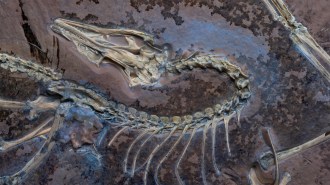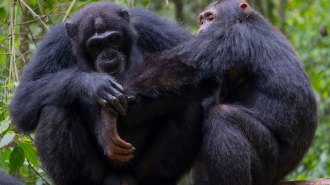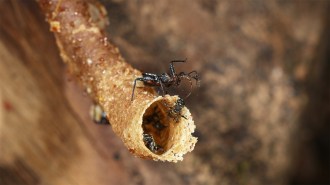News
-
 Health & Medicine
Health & MedicineFDA plan to ban fluoride supplements baffles and alarms dental experts
Fluoride supplements have been used in the United States for decades and have proven to be safe and effective for decreasing cavities.
-
 Health & Medicine
Health & MedicineAn at-home cervical cancer screening device was OK‘d by the FDA
The Teal Wand, an at-home HPV testing device that could replace a Pap smear, could broaden access to cervical cancer screening.
By Meghan Rosen -
 Genetics
GeneticsWhat gene makes orange cats orange? Scientists figured it out
Researchers found the gene and genetic variation behind orange fur in most domestic cats, solving a decades-long mystery.
-
 Oceans
OceansSeafloor amber may hold hints of a tsunami 115 million years ago
Oddly shaped deposits of tree resin point to massive waves that struck northern Japan roughly 115 million years ago and swept a forest into the sea.
-
 Space
SpacePerseverance takes the first picture of a visible Martian aurora
A faint yet visible Martian aurora is the first instance of the phenomenon spotted from another planet's surface.
By Nikk Ogasa -
 Paleontology
PaleontologyThis exquisite Archaeopteryx fossil reveals how flight took off in birds
Analyses unveiled never-before-seen feathers and bones from the first known bird, strengthening the case that Archaeopteryx could fly.
-
 Health & Medicine
Health & MedicineHHS says new vaccines should be tested against placebos. They already are
Placebo testing has been part of the process since the 1940s. It’s unclear what additional measures would achieve — but it may slow development.
-
 Animals
AnimalsWild chimpanzees give first aid to each other
A study in Uganda shows how often chimps use medicinal plants and other forms of health care — and what that says about the roots of human medicine.
-
 Plants
PlantsA leaf’s geometry determines whether it falls far from its tree
Shape and symmetry help determine where a leaf lands — and if the tree it came from can recoup the leaf’s carbon as it decomposes.
-
 Health & Medicine
Health & MedicineHumans have shockingly few ways to treat fungal infections
It's not quite as bad as The Last of Us. But progress has been achingly slow in developing new antifungal vaccines and drugs.
-
 Animals
AnimalsThis tool-wielding assassin turns its prey’s defenses into a trap
This assassin bug's ability to use a tool — bees’ resin — could shed light on how the ability evolved in other animals.
-
 Chemistry
ChemistryA chemical in plastics is tied to heart disease deaths
In 2018, over 350,000 excess heart disease deaths were linked to phthalates. More research is needed to fully understand the chemicals' effects.
By Skyler Ware